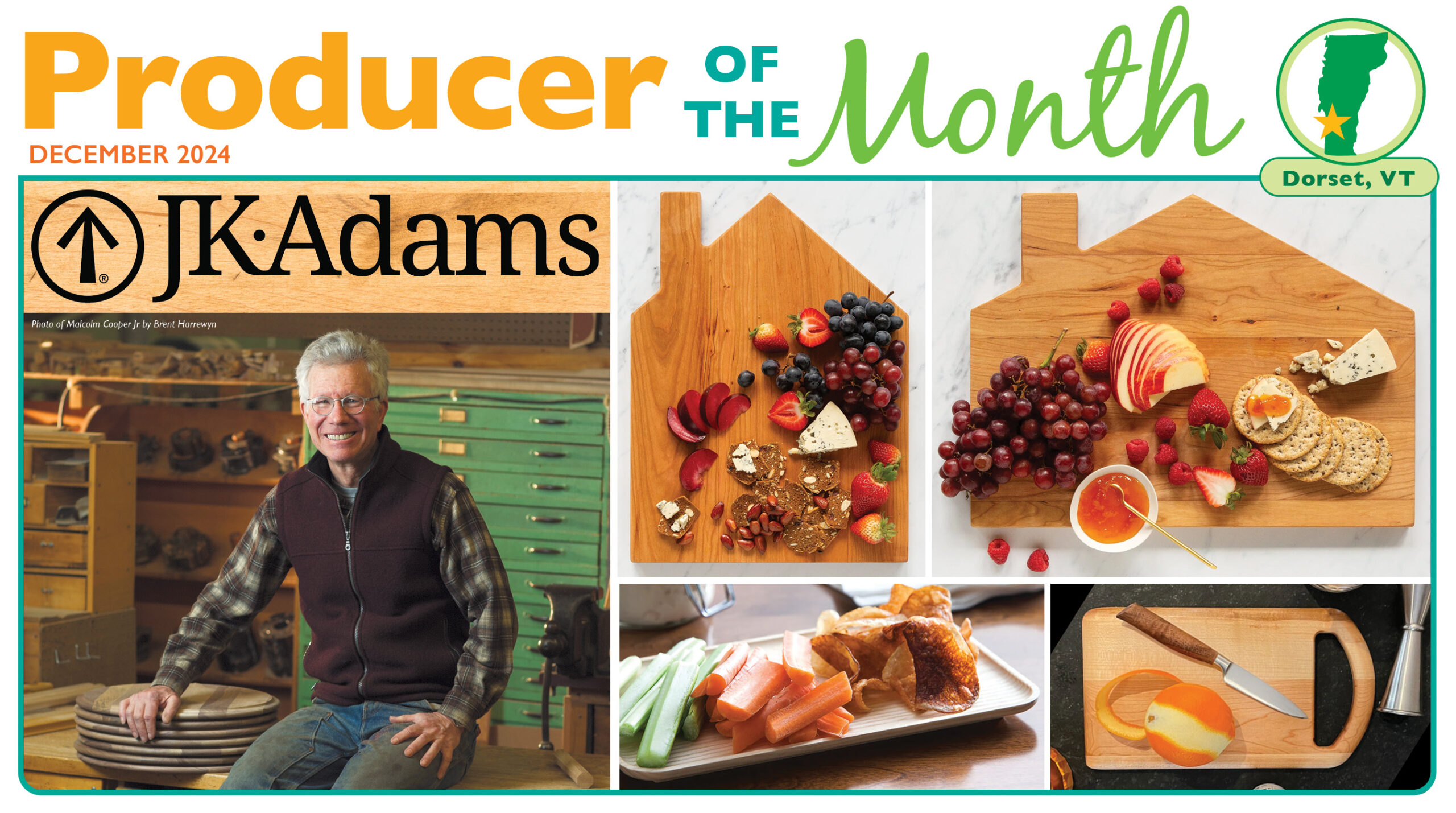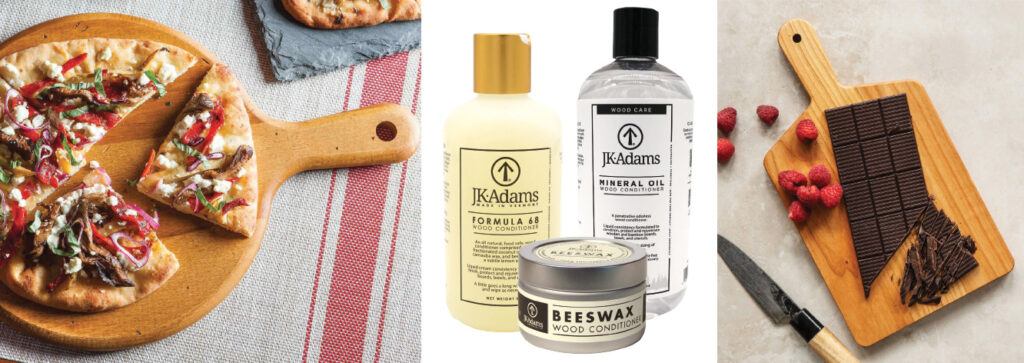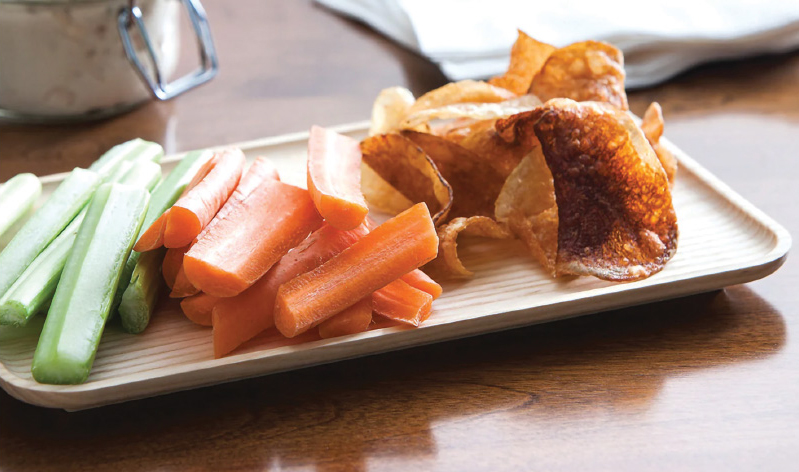JK Adams

For over 80 years, JK Adams has grown and evolved in Dorset, Vermont. From its origins as a manufacturer of surveying tools to its current standing as a premier creator of high-end kitchenware, the company has adapted and changed with the times while staying rooted both in its values and its community.

From Surveying Tools to Kitchenware
The company was founded in 1944 by Josiah Knowles Adams, and the first thing they manufactured was a small wooden toy called the Speedy Racer. In 1949 Malcolm Cooper Sr. joined the business, and it has remained in the Cooper family ever since, although they have maintained the original name.
In the post-World War II era, the company expanded as the demand for schematic equipment surged in response to the growing boom in home construction across the United States. Through the 1960s and 70s, the company thrived on the sale and manufacture of surveying tools and related equipment, like mechanical slide rules and other wooden implements. A byproduct of their production—off-cut wood—found new life in the form of small cutting boards, which they sold locally for just a dollar. Originally, these boards were a humble afterthought, but they formed the foundation of the company’s future success.
Through the 1970s and 80s the company embraced new product lines for home kitchens, such as toast tongs and modular wine racks. The latter, along with their innovative angled knife block, would become staples in homes across the country. By the late 1970s, the company had developed a reputation for creating thoughtful, functional, high quality, and aesthetically pleasing designs that resonated with homeowners and kitchen enthusiasts alike. This ability to pivot in response to consumer and market demands while maintaining a commitment to craftsmanship is one of JK Adams’ defining characteristics.
Sustainability and Ethical Sourcing
Today, the company’s commitment to sustainability remains central to its operations. In the past, all of the wood used in their production was sourced directly from the surrounding forests of Dorset; today, the majority comes from nearby regions, including Maine, Pennsylvania, and Ohio, with occasional shipments from Canada. The company sources hardwoods such as maple, ash, cherry, and walnut, and is dedicated to using sustainably certified forests. All JK Adams’ raw material vendors are PEFC (Programme for the Endorsement of Forest Certification) certified, ensuring that logging is conducted responsibly and that areas are reforested after harvesting.
Sustainability goes beyond sourcing. The company adheres to strict environmental practices in its production processes, with a specific focus on minimizing waste. Any wood that cannot be made into a product, either due to size or quality, is repurposed as biofuel to heat the facility, or sold as sawdust to local farms for animal bedding. The factory itself operates with a “net-zero waste” policy.

Caring for Wood
JK Adams boards and trays are made to last a lifetime, and they will, as long as they’re treated properly with periodic conditioning. Our Co-op sells their conditioning formulas, which are made with food-safe ingredients: mineral oil, which hydrates the seams of the wood and prevents cracking, and beeswax, which creates a protective surface layer that locks in moisture. They recommend handwashing with warm, soapy water and drying with a towel. Never soak them, run them in a dishwasher, or use them in a microwave. Apply your choice of JK Adams wood conditioner weekly, with a lint free cloth, to all surfaces until the finish is established, and any time the board feels dry.
As a natural material, wood has the added benefit of being antimicrobial, a feature that is increasingly appreciated as consumers become more aware of the risks posed by plastics and other synthetic materials in kitchen products. Unlike plastic, which can leach chemicals into food, wood does not release harmful substances and is naturally more resistant to bacteria. This makes it an ideal choice for kitchenware that comes into contact with food.
A Family-Oriented and Community-Centered Business
Beyond its commitment to quality products and sustainable practices, the company has also fostered a close-knit, family-oriented work environment. Currently employing forty-four individuals, the company values long-term relationships and a team-centered culture. Many of its employees have been with the company for decades, and the longest-serving employee, Janice, has been with the company for fifty-eight years. There is a sense of warmth and community: it is not uncommon for staff to sit together on the dock and share meals during lunch breaks, and there are annual parties and get-togethers, all of which is underpinned with robust wages and benefits to support employees and their families.
The company is a vital part of Dorset’s economy. Dorset is a small, rural town, so JK Adams plays a huge part as an employer. They also host the Dorset Winter Farmers’ Market and contribute to local charitable endeavors.
The company’s commitment to its employees, customers, and the local community is further demonstrated by its certification as a Vermont State B Corporation. This designation reflects a formal commitment to balancing profit with purpose: as a Benefit Corporation, the company considers the impact of its decisions on workers, the environment, and the community, not just its finances.

Conclusion
From its beginnings, JK Adams has consistently adapted to changing times while preserving the values that have guided it for over eight decades, supporting and strengthening their hometown of Dorset, VT, all the while. Visit our Co-op’s specialty case and Cheese department to see the beautiful boards and trays we have in stock—they make excellent gifts, especially when they’re topped with an assortment of delicacies like fine cheeses and other charcuterie!
Written by Ruth Garbus
About Producer of The Month

Shop Online

On Sale Now!

